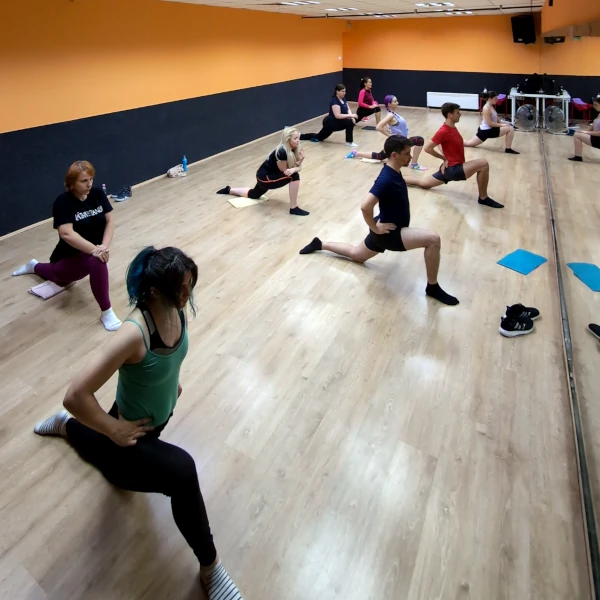Intense Workout? 5+1 Tips for Effective Recovery
Find out what happens in your muscles during and after a workout, and what steps you can take for a faster recovery.

After every Dance Workout session, you might wonder: how can you help your body recover? in this post, you'll learn what happens in your muscles during and after a workout, and what steps you can take for a faster recovery.
The key to recovery is proper hydration, nutrition, stretching, and rest. Everyone is unique, just as you are, so listen to your body's signals. The most important thing is to enjoy the movement and find the recovery methods that work best for you.
1. Stretching
Stretching after a workout plays a crucial role in recovery, posture improvement, and several other important functions, so it's worth scheduling it at the end of every workout and paying close attention to it.
The stretching performed at the end of the in-person studio classes or the full list workouts in the Video Library App helps to relax the muscles and increase flexibility, so you don't have to do anything further. Incorporating a few simple stretching exercises at the end of your workout can greatly contribute to recovery.
Why do you need it? What should you do and for how long? What are its types? You can read more about these here.
2. Hydration
Drink plenty of water throughout the day, especially after an intense workout. During the workout, it's a good idea to replenish fluids several times, evenly, with a few sips. Water helps maintain proper body moisture and removes toxins.
During and after longer or more intense workouts, it's also worth replenishing electrolytes. Isotonic drinks or homemade electrolyte solutions can help restore the balance of minerals.
Electrolytes (e.g., sodium, potassium, magnesium) are minerals that help maintain proper fluid balance in the body, regulate nerve impulses, and muscle contractions. During intense exercise or in hot weather, we sweat and lose electrolytes, which must be replenished. Moreover, our body heats up during exercise, and water helps in heat dissipation and normalizing body temperature.
How much fluid should you consume in a day? Would you like to make a homemade electrolyte solution from fresh vegetables or fruits? Are you interested in the negative effects of alcohol? You can read more about these here.
3. Nutrient Intake
Consume foods rich in protein and carbohydrates after your workout. Protein helps with muscle building, while carbohydrates replenish energy stores.
The ideal macronutrient ratio can vary from person to person, but generally, protein intake should be higher after a workout compared to regular meals. Experiment with different foods and listen to your body's signals.
During a workout, your muscles consume energy and sustain micro-tears. The post-workout meal helps you replenish lost energy and provides your muscles with the necessary building blocks for recovery.
The ideal time to eat is 30-60 minutes after finishing your workout. If you eat later than that, your muscles won't get the necessary nutrients for recovery in time. However, if you ate before the workout, your body will continue to use those nutrients for repair.
What is protein good for? What and when should I eat? What if I consume too little or too much protein? You can read more about these here.
4. Vitamins and Minerals
Vitamins and minerals play a key role in post-workout recovery. A balanced diet and, if necessary, supplements can ensure that your body gets all the nutrients it needs.
If you follow a balanced diet, you are likely getting enough of the necessary vitamins and minerals. However, in certain cases, such as increased physical activity or a vegan or vegetarian diet, supplements may be necessary.
What foods should you eat? What contains what? What vitamins and supplements should you take? You can read more about these here.
5. Sleep
Sleep is not just rest but a fundamental process of our body's renewal, essential for recovery and health. If you want to improve your sleep quality, pay attention to your diet, establish a regular sleep routine, and create a calm sleeping environment.
How can you improve your sleep quality? Why is it important for athletes? You can read more about these here.
5+1. Other Factors
For post-workout recovery, not only rest but also active rest and various regeneration techniques can be useful. Massage, sauna, and ice baths, as well as light forms of exercise, can help you recover faster after workouts and improve your performance.
- Active Rest: Light forms of movement, such as walking or yoga, help maintain continuous blood circulation in the muscles and improve joint mobility and flexibility.
- Massage: Massage aids recovery by relaxing muscles, increasing blood circulation, removing waste products, and reducing stress, thereby promoting faster healing.
- Sauna and Ice Bath (hot-cold shower): Thanks to the alternation of hot and cold, contrast therapy stimulates blood circulation, reduces inflammation and swelling, and alleviates muscle pain.